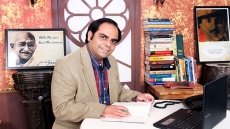“We live in a world where amateurs are taking over government. I tend to respect systems where professionals are in charge.”
It’s hard to find somebody as accomplished in his field as Dr. Parag Khanna. Not only does the global strategy advisor run his own business (FutureMap), a company that works with governments and corporations to help them navigate complex socio-political scenarios, Khanna is also a celebrated author, the latest of his books – The Future Is Asian – just came out earlier this year.

The geopolitical strategist – who for the last six years has been living in Singapore – sees his work as observation and forecasting, but also aims to help governments get their policies right. With that goal in mind, he has worked with the Centre on Asia and Globalization, the New America Foundation, and the World Economic Forum. During 2007, Dr. Khanna worked as advisor for General Stanley McChrystal in the US Special Operation Forces in Iraq and Afghanistan.
A world traveller that has visited nearly 150 countries, Dr. Khanna has managed to combine his passion with the demands of his job: “I travel every single week, I was just in Chile and I’m going to India tonight. Now, adventure travel is something you have to explicitly schedule. This summer for example, I spent six weeks travelling through Central Asia, from Turkey to Kazakhstan. They’re some of the most dynamic, fast changing places in the world.”

Dr. Khanna’s goal is not to predict future geopolitical events, but offer a forecast. He is responsible for ideas like “China wants to win the new great game by building the new Silk Road,” a notion that would go on having a life of its own: “Each book that I write is meant to present a framework. Of all of them, Connectography is the one I would take to the grave. To write that book – a reimagination of the organization of the human species according to infrastructure and supply chain – is the hardest thing I’ve ever done. I don’t think I can think as deeply ever again.”
The strategist acknowledges the path that led him to his current role is no longer available: “There used to be a steady trajectory from undergraduate to academia. That model doesn’t hold anymore. If you think how politicized everything has become, it’s hard to pretend that by checking the same boxes you would come to the same outcome. You have to be more creative.”
Because of his work, Dr. Khanna has met a number of world leaders, some of which have impressed him greatly. Former Foreign Affairs Minister and current President of Germany Frank-Walter Steinmeier comes to mind: “He is an expert in global issues, an intellectual who is very concerned with public welfare and leads the dialogue around using democracy to build solidarity.” He also thinks highly of the Prime Minister of Singapore, Lee Hsien Loong. “If it could be objectively measured, he would be the smartest head of state,” he believes.

Q & A
We are witnessing considerable social unrest in different corners of the world. Do you think this obeys to particular circumstances or are there common elements?
I call it the “global underclass revolt.” The common denominators are the frustration with corruption and power structures and inadequate quality of life. Young people driving these movements. They feel very marginalized by the circumstances. My next book will be about them. We’ve never had a generation that’s having less children than itself. They’re not reproducing. It has a lot to do with economics and the environment.
Indians around the world have made significant contributions to their immigrated countries. What do you think of this accomplishment?
There is something about cultural openness. Indian immigrants tend to assimilate very quickly in different societies. It’s the second largest diaspora: 40 million Indians is a number larger than the population of many countries. There is a common national pride and a sense is very important to contribute to the overall health of the (adoptive) country, whether is economic, social or developmental.



